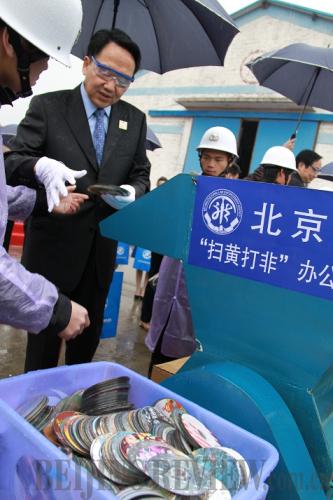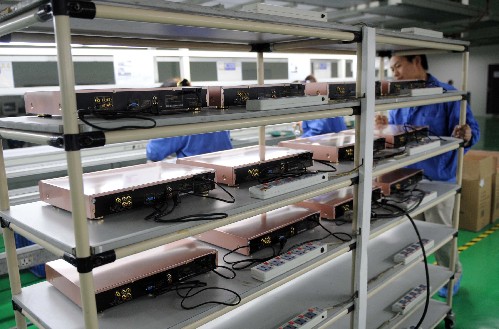|
 |
|
STAMP IT OUT: Pirated products are destroyed in Beijing (QU JING) |
 |
|
EXPENSIVE LESSON: Chinese manufacturers have learned to patent their upgraded NVD techonology (LIU XIAOGUO) |
Once seen by the international community as a perpetrator of intellectual property rights (IPR) violations, China has become a victim in this global scourge. Recent cases given wide media exposure include Internet giant Google scanning Chinese books into its database without authorizations from the authors, and Microsoft Windows using Chinese word banks and fonts developed by a Chinese company without authorization.
"IPR protection is closely related to a country's economic development since it can greatly encourage technology innovation and progress," Li Shunde, Dean of Law and IPR Department of Graduate School of Chinese Academy of Sciences told ChinAfrica. "With the rapid economic development in China, Chinese enterprises need to pay more attention to safeguarding their IPRs."
According to Li, during the 30 years after China's joining the World Intellectual Property Organization (WIPO) on June 3, 1980, the country has made great progress in IPR protection systems, especially in the first 20 years when China formulated all the related laws including the Trademark Law, Patent Law and Copyright Law, and established competent administration departments such as the State Intellectual Property Office and the National Copyright Administration.
Currently, China has completed its third amendment to the Patent Law to make it more compliant with international norms.
"China has complete legislation in IPR protection, but we still need to improve our law enforcement efforts," Li noted. He explained that the efforts should focus on combating piracy and trademark imitation, which are challenges facing the whole world. Li has been studying the development of China's IPR since 1985.
Like Japan and South Korea in their early stages of development, the prosperity of China's manufacturing industry has seen multinationals blaming the country for ongoing IPR violations. Shanzhai product, which literally mean products produced in mountain villages, is one of the issues blamed by multinationals. Many small manufacturers, especially mobile phone manufacturers, produce low-cost products with advanced functions by combining advantageous technologies and good designs of some famous brands with no patents together. According to estimation of China Market Intelligence Center, the market scale of shanzhai mobile phones reached 21.63 billion yuan ($3.17 billion).
However, behind all these blames, many Chinese enterprises and industries are facing heavy pressures of protecting their own IPRs.
The DVD player industry
IPR is widely believed to be a double-edged sword, which can encourage the development of an industry when used effectively, and restrain development if improperly used.
The fate of China's DVD player manufacturers is a prime example. In the past decade, China's DVD player industry experienced a roller coaster-like development path.
Wanyan of China was the first company in the world to produce the VCD player in 1993, the predecessor of DVD players. However, due to lack of awareness of IPR protection, Wanyan did not apply for patent protection. This led to imitators gradually usurping Wanyan's leading market position without paying a single cent. Wanyan eventually faded out of the market, after creating a sound environment for the development of this technology.
The late 1990s witnessed a boom for China's VCD and DVD player manufacturing industry. In 2001, China's DVD industry reached its peak with Shinco being the market leader in this field, popular in markets as far from home as Wal-mart and Best Buy in the United States. Thanks to its high quality and low price, it led the world's market share with a 35 percent global stake.
However, the complacent company neglected the importance of its own core technology and failed to seek patent protection. In 2002, Shinco and many other Chinese DVD player manufacturers were surprised to find that they were then required to pay their foreign competitors who had now patented the DVD technology whose predecessor had been invented in China.
European customs frequently detained China's exported DVD players, forcing the manufacturers to pay patent fees. After that, DVD 6c (Mitsubishi, Toshiba, Hitachi, Panasonic, JVC, and Time Warner) and DVD 3c (Philips, Sony, Pioneer) also forced Chinese manufacturers to pay them patent fees, which they had to do in order to survive.
From 2002 to 2008, the patent fees increased from $5 a unit to more than $20 a unit, reducing the profit of Chinese manufacturers to less than 30 yuan ($4.4) a unit. To make things worse, many other small companies joined in, making the price competition even fiercer. One unit of DVD player, previously priced at 2,000 yuan ($293), dropped in price to 300 yuan ($44).
Under the circumstances, China's DVD player industry declined rapidly. Many well-known domestic brands shifted their operations to other products and many small enterprises only produced DVD players for foreign companies.
"Actually, we stopped our DVD player export because of the slim profit in 2002 and sometimes only produce for foreign companies," said Fan Wenjian, Deputy General Manager of Shinco Sales Center in an interview with Economic Observer News. "Now, you can not find any Chinese DVD player brands in the overseas market."
To help overcome their dilemma, some Chinese companies developed an EVD (Enhanced Versatile Disc) player with its own decoding patents. "But they still need to pay the 6c [patent fees] since these machines can also read DVD disks," said Li. He added that IPR oversight would forever be seen as the demise of the local DVD player industry.
The legal route
Fortunately, there are some cases where Chinese big brands regained their rights through legal proceedings in foreign countries.
Beijing Wangzhihe is one of the companies that successfully safeguarded its IPR through lawsuits in Germany. In 2006, the foodstuff company with a history of 341 years was surprised to find that its "Wangzhihe" trademark and its logo, which the company has been using ever since its establishment, was preemptively registered in Germany by a German company Okai. This came to light when Beijing Wangzhihe tried to explore the European market. It immediately decided to reclaim its interests through litigation. During the process, Okai hoped Wangzhihe would purchase its trademark in Germany but was refused.
In 2009, Wangzhihe won the case. "This case sends a positive signal to Chinese enterprises to safeguard their rights abroad and reminds more Chinese enterprises that are exploring overseas market of the awareness of trademark protection and right safeguard," said Li, adding that Chinese enterprises should learn to use international rules and laws.
Wangzhihe is only one of the large numbers of Chinese companies whose legal rights are violated abroad. Statistics from the State Administration for Industry and Commerce show that during the period from 1980 to 2009, more than 2,000 trademarks of China's export commodities were illegally registered abroad, causing 1 billion yuan ($143 million) of loss of intangible assets every year.
IPR awareness
The Madrid system for the international registration of marks (the Madrid system) under WIPO is an important channel for enterprises to protect their trademarks in the international community. Through the system, a company can have its trademarks protected in all the member countries and does not need to register them in different single countries. China joined the Madrid system in 1989, yet Chinese companies still seem to lack interest in the system, or, rather, they have less sense of protecting their trademarks compared to their foreign counterparts.
Figures from the State Administration for Industry and Commerce show that in 2008, a total of 17,000 trademarks of foreign companies were registered through the Madrid system for protection in China; however, during the same period, only 2,059 Chinese trademarks were registered through the system for protection in foreign countries. In total, China has only more than 8,600 trademarks registered through the Madrid system.
The German company Okai who illegally registered Wangzhihe in Germany, also preemptively registered other Chinese brands such as Qiaqia, Laoganma, Baijia and Jinmailong noodles. But currently, only Baijia has indicated it will sue Okai. "Chinese companies still has a long way to go in terms of improving their awareness of safeguarding their rights abroad," said Li. |